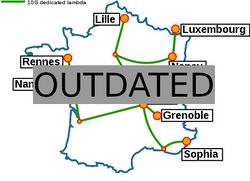Grid5000:Home
|
Grid'5000 is a large-scale and versatile testbed for experiment-driven research in all areas of computer science, with a focus on parallel and distributed computing including Cloud, HPC and Big Data. Key features:
Older documents:
|
Random pick of publications
Five random publications that benefited from Grid'5000 (at least 2517 overall):
- Chuyuan Li, Chloé Braud, Maxime Amblard. Multi-Task Learning for Depression Detection in Dialogs. 23rd Annual Meeting of the Special Interest Group on Discourse and Dialogue (SIGDIAL 2022), Sep 2022, Edinbourg, United Kingdom. pp.1-8, 10.48550/arXiv.2208.10250. hal-03724305 view on HAL pdf
- Dinh Ngoc Tu, Boris Teabe, Daniel Hagimont, Georges da Costa. Optimized Resource Allocation on Virtualized Non-Uniform I/O Architectures. 22nd International Symposium on Cluster, Cloud and Internet Computing (CCGrid 2022), May 2022, Taormina, Italy. pp.432-441, 10.1109/CCGrid54584.2022.00053. hal-03738261 view on HAL pdf
- Maxime Lanvin, Pierre-François Gimenez, Yufei Han, Frédéric Majorczyk, Ludovic Mé, et al.. Towards understanding alerts raised by unsupervised network intrusion detection systems. The 26th International Symposium on Research in Attacks, Intrusions and Defenses (RAID ), Oct 2023, Hong Kong China, France. pp.135-150, 10.1145/3607199.3607247. hal-04172470 view on HAL pdf
- Radita Liem, Shadi Ibrahim. Revisit Data Partitioning in Data-intensive workflows. PDSW 2022 - 7th International Parallel Data Systems Workshop, Nov 2022, Dallas, United States. hal-03913369 view on HAL pdf
- Ilya Meignan--Masson. Bridging the gap between profiling and monitoring in HPC systems with dynamically reconfigurable fine-grain data collection. 0 Université Grenoble Alpes. 2022. hal-03773464 view on HAL pdf
Latest news
Failed to load RSS feed from https://www.grid5000.fr/mediawiki/index.php?title=News&action=feed&feed=atom: Error parsing XML for RSS
Grid'5000 sites
Current funding
As from June 2008, Inria is the main contributor to Grid'5000 funding.
INRIA |
CNRS |
UniversitiesUniversité Grenoble Alpes, Grenoble INP |
Regional councilsAquitaine |


